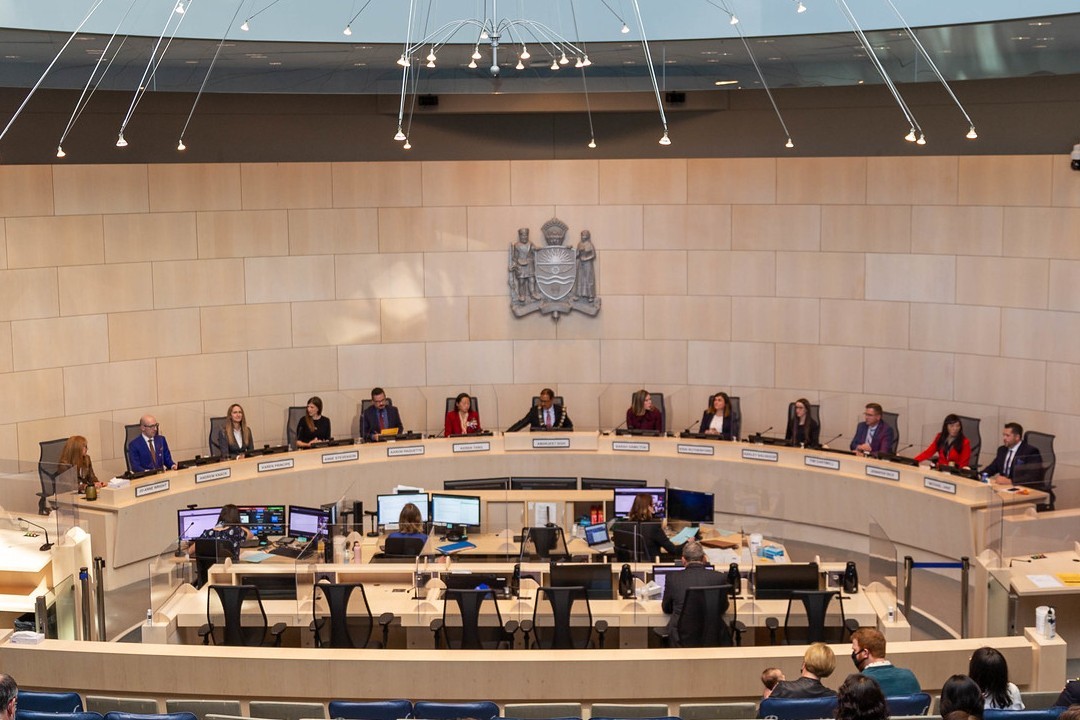Edmonton's city councillors return to formal meetings this week after a summer break. They are scheduled to discuss a proposed loan to build affordable housing, a proposal to sell two historic city properties, and a possible change to the limit on the size of businesses in certain zones, among other matters.
There is an agenda review committee meeting, an urban planning committee meeting, and a special city manager recruitment meeting scheduled for Aug. 13. There is an executive committee meeting scheduled for Aug. 14. There is a non-regular city council meeting and an emergency advisory committee meeting scheduled for Aug. 15.
Here are critical items on this week's agenda:
- Executive committee is set to discuss a proposal to loan Civida, the largest provider of affordable housing in Edmonton, up to $8 million. In 2020, council approved the sale of a surplus school site in Keheewin to Civida for less than market value in exchange for providing affordable housing there for 40 years. Civida has now requested $8 million from the city to build affordable units at the site. The project has created friction in the community in the past. The city report said Civida's request, combined with the 2020 land sale, would mean the city's total outlay would be $11.24 million.
- City administration proposes selling two heritage homes in Wîhkwêntôwin to Little Village Wellness Centre for less than market value. In 2023, Little Village purchased the adjacent John L. Lang property (a city-owned historic resource) and now operates a child psychology facility there. The organization wants to buy the historic Dame Eliza Chenier residence (valued at $600,000) and Lester Allyn House (valued at $500,000), both on 112 Street, and create an early child developmental centre. Both properties have been for sale since 2021. The city first bought the Lang, Chenier, and Allyn properties in the 1970s to expand its road network, but never did so.
- City administration proposes limiting the size of businesses in some residential zones to 2,150 square feet, which is less than the current limit but larger than the maximum suggested by council last year. In 2023, city council passed a motion that requested an administration report to analyze what it would mean to reduce the maximum floor area of commercial establishments in the small-scale residential zone from roughly 3,230 square feet to 1,075 square feet. The resulting report to urban planning committee this week is cool to council's idea, saying the lower limit would substantially restrict commercial uses in several zones and make converting average-sized homes into businesses difficult. "Administration interprets the intent of the motion to be to continue supporting this business opportunity while reducing the potential impact of new businesses on neighbours," the report reads.

Back to business: After more than a month off for a summer break, council is back this week for committee meetings and to hear more on the search for a new city manager. (Mack Male/Flickr)
Here are some other items on the agenda:
- City administration recommends that the city should not get involved in disputes where an infill developer damages adjacent homes, according to a report carried forward from a June 18 urban planning committee meeting. Councillors asked administration to look into how the city could help homeowners whose properties are damaged by infill developers, but administration said doing so would create financial and legal risks for the city. The city also examined whether it should require shoring when builders are creating a typical basement, and estimates it would extend construction timelines by two to four weeks and cost up to $50,000 more per new house. Administration said it is working on a construction accountability program to target builders who repeatedly create non-compliant conditions at construction sites.
- Administration does not support establishing a financial assistance program for businesses affected by major construction. In a report carried forward from a June 19 executive committee meeting, administration said financial support would be provided after losses occur and may not help in time. The assistance program would also assume that construction was responsible for any financial loss rather than external factors like changing market conditions, increasing costs, or inefficient business models. City staff estimate the program would cost $225,000 per 100 businesses, plus $200,000 in administrative expenses. Administration has also presented the option of establishing a grant program, where the city would proactively give money to businesses near major construction projects.
- Administration has created structural budget variances and action plans to address them in a report to executive committee. A structural budget variance is a recurring deficit or surplus that can be attributed to an event or circumstance that has changed business operations, such as the COVID-19 pandemic's effect on commute patterns. The report notes administration will bring recommendations for strategic shifts in budgeting to this fall's supplemental budget adjustment.
Meetings stream live on YouTube on the Chamber channel and River Valley Room channel.
